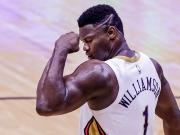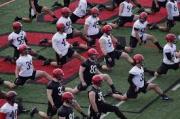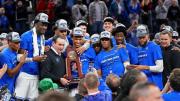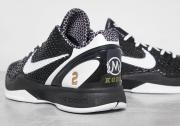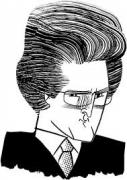Female athletes are being pressured to loose weight and to look good for the camera in order to get and keep their sponsorships. Here is a story about Olympic High Jumper Priscilla Frederick-Loomis and her challenges with expectations and eating disorders.
The rejection was brutal. At the age of 16, Priscilla Frederick-Loomis attended a model agency casting session in New York City where she was told that she was "too heavy."

Even now at the age of 31, those two words still play on the Olympic high jumper's mind. Raised by a single mother in New Jersey, Loomis also toyed with the idea of becoming an actor and that's a dream she hasn't given up on as she has pursued her athletics career.
"I'm going to use track and field as a way to make a name for myself," Loomis, who is a two-time Pan American Games silver medalist and competed at the 2016 Olympics in Rio, tells CNN Sport from her home in the US. She represented Antigua and Barbuda, where her father is from.
Pursuing a career in track and field hasn't been easy.
"When you are trying to be an elite athlete, on top of trying to get signed on, on top of dealing with coaches, you also have, the pressures, one for me, of being an African-American female representing a Caribbean island. And you're adding on top of all that body shaming."
Even though she never thought she had an eating disorder, Loomis remembers a conversation she had with her college nutritionist, asking: "'How can I be anorexic and be an athlete?'"
"When I said to my nutritionist that I want to be anorexic, never did I mean I want to have an eating disorder. The power of the word wasn't apparent to me.
"Now, I look back like and think, 'What the hell was wrong with me? I didn't even realize a lot of female athletes have eating disorders."
But at that point in her career, that's what Loomis felt she had to do to be successful given she was 158 lbs and is 5 ft 10 tall, which she noted is six inches shorter and at least 20 pounds more than her rivals.
"In my head, it was common sense: don't eat a lot, look better, jump better," said Loomis, who remembers a time at college when her then coach Richard Fisher advised her to grab something to eat after a training session.
"I wanted an ice cream, a little ice cream," she says as she demonstrated how small the size was.
Except another coach told Loomis to put the ice cream down.
According to US-based eating disorder expert Dr. Gayle Brooks our culture emphasizes and overvalues thinness as the health and beauty ideal.
"When this cultural value system is combined with the pressures of athletic competition, which places an emphasis on diet, appearance, size and weight to achieve peak performance, it places some athletes at high risk of developing disordered eating and possibly eating disorders," Dr. Brooks told CNN Sport.
Dr. Brooks is the vice president and chief clinical officer for the Renfrew Center, a US-based clinic specializing in eating disorders treatments. Over Brooks' 30 year career, she has treated many patients who suffer from eating disorders and acted as the eating disorders specialist in the HBO film Thin.
According to a US study -- Prevalence of Eating disorders among Blacks in the National Survey of American Life -- anorexia was the rarest eating disorder among African American adults and adolescents, while binge eating was the most prevalent eating disorder among adults and adolescents.
"We are really understanding more and more that eating disorders are not just a White, suburban women's disease, and that, you know, for a long time the belief was that women of color, particularly Black women, were protected culturally from developing eating disorders," said Dr. Brooks.
As she trained for her first Olympic appearance in 2016, Loomis adhered to a strict diet.
"I would eat super healthy and super clean, be on it for a month. One time I was just like, 'I really would love a donut, or I really would love a cupcake' and I have a sweet tooth."
However, according to then-coach Richard Fisher, Loomis wasn't eating enough.
"We started working together, she was eating maybe three meals a day tops. Everything was low and minimum.
"She would be so hungry, she would eat unhealthy things as anyone, and her lack of nutrition was hindering her from performing the correct way that she needed to."
The track and field coach adds: "A lot of coaches look at, I would say the average high jumper who's professional and look at their height and their weight ratio.
"They use that as the standard for what they believe an athlete should be, which in reality is not true all the time. Yes, it might be the perfect standard of what you want. But a lot of these athletes, you have to realize, are one a billion.
"Priscilla always used to say to me, 'I'm the shortest, fattest high jumper out there.'"
According to World Athletics, in a statement sent to CNN: "There is no one kind of body measurement requirement to qualify for the Olympics. That is not the case. There is no such requirement. The qualifying standards are all based around performance."
Last year World Athletics released a Nutrition Consensus Statement providing the latest research and guidance around nutrition to athletes, coaches and administrators.
In a statement sent to CNN Sport, the International Olympic Committee also said it "stands for non-discrimination as one of the founding pillars of the Olympic Movement, which is reflected in the Olympic Charter, Fundamental Principle 6.
"The enjoyment of the rights and freedoms set forth in this Olympic Charter shall be secured without discrimination of any kind, such as race, colour, sex, sexual orientation, language, religion, political or other opinion, national or social origin, property, birth or other status.
"Furthermore, athletes' safety and wellbeing is a priority and a core value for the IOC, which is committed to leading and supporting the Olympic Movement in the implementation of safeguarding measures, in line with its mission stated in the Olympic Charter to promote safe sport and the protection of athletes from all forms of harassment and abuse."
Even Loomis' teammates were all too quick to chime in with disparaging comments about her appearance.
After Loomis' appearance at the 2015 Outdoor World Championships in Beijing, she says she was called "thick" and "heavy" by her teammates from Antigua and Barbuda. And that was after she had just competed on the track.
The Antiguan and Barbuda Olympic Committee did not immediately respond to CNN Sport's request for comment.
Three years later she placed fifth in the high jump at the Commonwealth Games in Australia. She went to the bar to grab a beer to celebrate when a man, who recognized Loomis from her famous purple hair, came up to her and said, "Oh, I saw you on TV. If you would drop a few kilos, you would have performed better."
As a result of those comments, Loomis says she would drink a pot of coffee to dehydrate herself to appear slim on screen.
Loomis is currently working with a female coach, Lauren Biscardi, a former New York state champion in high jump, who the 31-year-old athlete says has "changed my professional career. She has helped me love training, love myself and has allowed me to feel."
Loomis competed at Rio in 2016 and has ambitions to compete at the Tokyo Olympics and at Beijing 2022.
You can the rest of the article Here
Source: CNN
###
Read more




